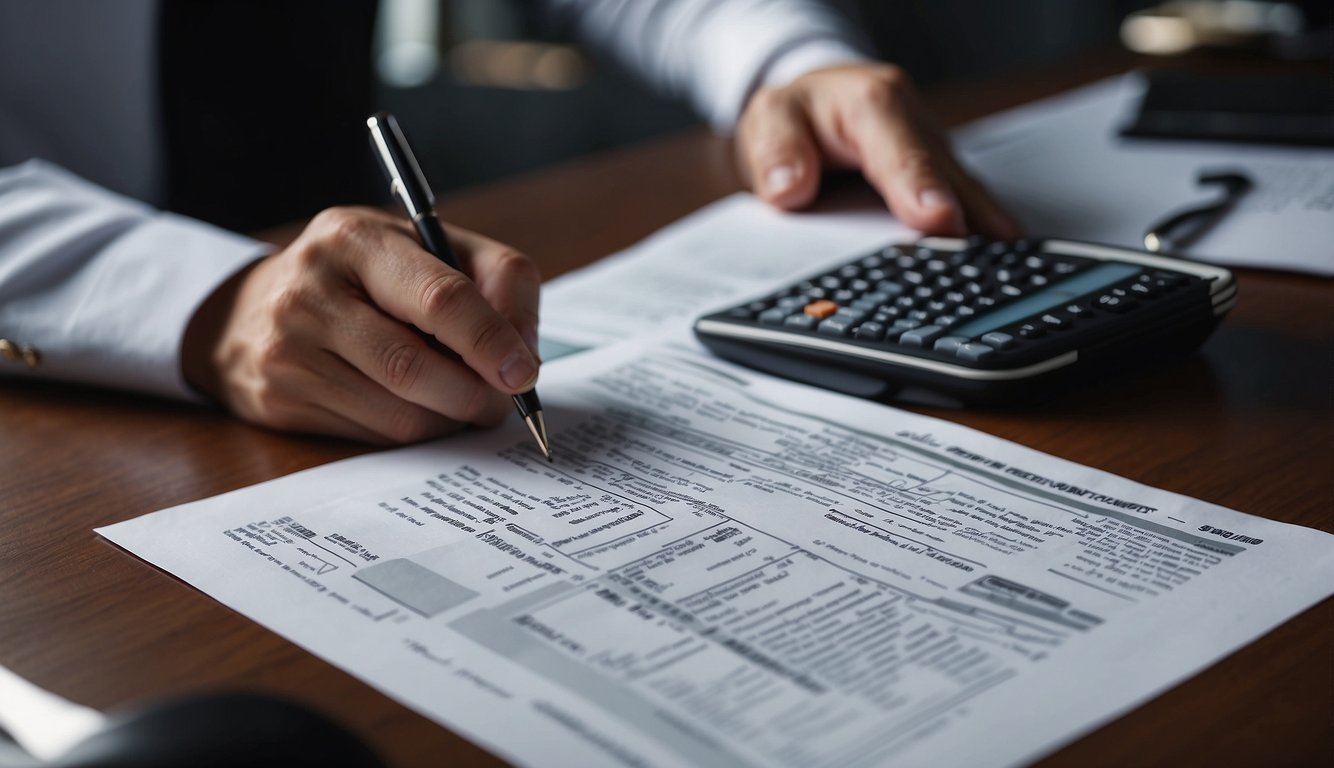If you’ve taken out a personal loan, you know how much of a financial burden it can be. Whether you’re struggling to make payments or you want to get out of debt faster, there are plenty of reasons why you might be considering how to get out of a personal loan. Fortunately, there are strategies you can use to pay off your loan early or exit it altogether.

Understanding Personal Loans is critical to knowing how to get out of them. Personal loans are unsecured loans that can be used for various purposes, from consolidating debt to financing home improvements.
They typically come with fixed interest rates and repayment terms, making them easier to manage than credit card debt. However, a personal loan can quickly become a burden if you’re struggling to make payments or dealing with unexpected expenses.
This article will explore the Top Reasons to Get Out of a Personal Loan, Strategies for Exiting Personal Loans, and the Consequences of Defaulting on a Loan. We’ll also discuss Alternatives to Taking Out Personal Loans and how to prepare for a loan application. Whether you’re dealing with a life event affecting your finances or want to get out of debt faster, this guide will help you understand how to get out of a personal loan.
Key Takeaways
- Personal loans can be a financial burden, but there are strategies you can use to pay them off early or exit them altogether.
- Understanding the reasons why you might want to get out of a personal loan is key to developing a plan for doing so.
- By exploring alternatives to taking out personal loans and preparing for a loan application, you can avoid getting stuck in a cycle of debt.
Understanding Personal Loans

If you are considering taking out a personal loan, it is essential to understand the different types of loans available and the interest rates and repayment terms associated with them.
Types of Personal Loans
Personal loans can be either secured or unsecured. Secured loans require collateral, such as a car or house, to be used as security against the loan. Unsecured loans do not require collateral but may have higher interest rates.
Interest Rates and Repayment Terms
Interest rates for personal loans can be either fixed or variable. Fixed interest rates remain the same throughout the life of the loan, while variable rates may change over time. Understanding the Annual Percentage Rate (APR) associated with your loan, including the interest rate and any related fees, is essential.
Repayment terms for personal loans can vary depending on the lender and the type of loan. Some loans may have shorter repayment terms of a few months, while others may have longer repayment terms of several years. Understanding the repayment terms and ensuring you can make the required payments on time is essential.
Overall, personal loans can be a valuable tool for managing your finances, but it is crucial to understand the terms and conditions of the loan before taking it out.
Top Reasons to Get Out of a Personal Loan

You are not alone if you have taken out a personal loan and are struggling to keep up with the payments. Many people find themselves in this situation, and it can be overwhelming. In this section, we will discuss the top reasons why you should consider getting out of a personal loan and what you can do to make it happen.
Get Out of a Personal Loan: High-Interest Rates and Better Alternatives
One of the most common reasons to get out of a personal loan is the high interest rates that come with it.
Personal loans can have interest rates as high as 36%, which can be difficult to manage, especially if you are already struggling financially. If you find yourself in this situation, it may be worth considering alternative options such as a balance transfer credit card or a debt consolidation loan with a lower interest rate.
Get Out of a Personal Loan: Financial Strain and Budget Management
Another reason to get out of a personal loan is the financial strain it can put on your budget. If you struggle to make your payments on time, it can cause stress and anxiety and make it difficult to manage your finances.
If you find yourself in this situation, it may be worth looking at your budget and finding ways to cut back on expenses or increase your income.
Get Out of a Personal Loan: Improving Credit Score
Taking out a personal loan can have an impact on your credit score. If you struggle to make your payments on time, it can negatively affect your credit score, making it more challenging to get approved for credit in the future. You can rebuild your credit score and improve your financial situation by getting out of your loan.
In conclusion, there are many reasons why you may want to get out of a personal loan. Whether it’s the high-interest rates, financial strain, or the impact on your credit score, it’s essential to take action and find a solution that works for you. By exploring alternative options and finding ways to manage your budget, you can take control of your finances and improve your financial future.
Strategies to Get Out of a Personal Loan

If you are struggling with personal loan payments, there are several strategies you can use to exit your loan. Here are some of the most effective options:
Get Out of a Personal Loan: Debt Consolidation Options
Debt consolidation is a popular strategy for exiting personal loans. With debt consolidation, you take out a new loan to pay off your debts. This can simplify your finances by consolidating multiple debts into a monthly payment. Debt consolidation options include:
- Personal Loans: You can take a personal loan to consolidate your debts. Personal loans typically have lower interest rates than credit cards, making them an attractive option for debt consolidation.
- Home Equity Loans: If you own a home, you can take out a home equity loan to consolidate your debts. Home equity loans typically have lower interest rates than personal loans, but they require you to put your home up as collateral.
- Lines of Credit: You can also use a line of credit to consolidate your debts. Lines of credit allow you to borrow money as needed, and you only pay interest on the amount you borrow.
Get Out of a Personal Loan: Negotiating with Lenders
If you are struggling to make your loan payments, you may be able to negotiate with your lender. Here are some strategies for negotiating with lenders:
- Payment Plans: You can ask your lender to set up a payment plan that fits your budget. This can help you avoid defaulting on your loan and damaging your credit score.
- Deferment or Forbearance: If you are experiencing financial hardship, you can ask your lender for a deferment or forbearance. This will allow you to stop making payments on your loan temporarily.
- Loan Modification: You can also ask your lender to modify your loan terms. This can include reducing your interest rate, extending your loan term, or changing your payment schedule.
Get Out of a Personal Loan: Utilising Savings or Emergency Funds
If you have savings or emergency funds, you can use them to pay off your loan. While this may reduce your savings, it can help you avoid defaulting on your loan and damaging your credit score. Here are some options for using your savings or emergency funds:
- Savings Account: If you have a savings account, you can use the funds to pay off your loan. This can help you avoid paying interest on your loan and reduce your overall debt.
- Emergency Fund: If you have an emergency fund, you can use the funds to pay off your loan. While this may reduce your emergency fund, it can help you avoid defaulting on your loan and damaging your credit score.
- Sell Assets: If you have assets like a car or jewellery, you can sell them to repay your loan. This can help you avoid defaulting on your loan and reduce overall debt.
Using one or more of these strategies allows you to exit your personal loan and regain control of your finances.
Get Out of a Personal Loan: Consequences of Defaulting on a Loan

If you default on a personal loan, it can have severe consequences on your credit history, legal status, and finances. Here are some of the potential repercussions you may face:
Impact on Credit History
Defaulting on a loan can significantly damage your credit history, which records your borrowing and repayment activities. Lenders use your credit history to assess your creditworthiness when you apply for credit in the future.
A default can remain on your credit report for up to six years, making it difficult to get credit approval, including personal loans, credit cards, and mortgages.
Legal and Financial Repercussions
When you default on a loan, the lender may take legal action against you to recover the outstanding debt. This can result in additional legal fees and court costs, adding to your financial burden. The lender may also sell the debt to a collection agency, which can then pursue you for payment. This can result in constant phone calls, letters, and even visits from debt collectors.
Defaulting on a loan can also impact your debt-to-income ratio (DTI), a measure of your debt compared to your income. A high DTI can make it difficult for you to get approved for credit in the future, as lenders may view you as a high-risk borrower.
To avoid defaulting on a loan, making your payments on time and in total is essential. Contact your lender to discuss your options if you struggle to make payments. Many lenders offer hardship programs to help you manage your debt and avoid default.
Alternatives to Get Out of a Personal Loan

If you’re looking for alternatives to taking out personal loans, a few options are available. Here are some of the most popular alternatives:
Budgeting and Saving
Budgeting and saving money is the best way to avoid taking out a personal loan. Setting a budget and sticking to it can avoid overspending and ensure enough money to cover your expenses. You can also save money by cutting back on unnecessary costs, such as dining out or buying expensive gadgets.
Exploring Other Credit Options
If you need to borrow money, other credit options are available to you besides personal loans. Credit cards, for example, can be an excellent alternative to personal loans. They offer a revolving line of credit that you can use to make purchases and pay back over time. However, it’s essential to know that credit cards can come with high-interest rates and fees, so read the terms and conditions carefully before applying.
Another option is exploring other types of loans, such as secured or home equity loans. These loans are secured by collateral, such as your home or car, making them easier to qualify for and with lower interest rates. However, you must know that you could lose your collateral if you default on the loan.
Overall, taking out a personal loan should be a last resort. By budgeting, saving money, and exploring other credit options, you can avoid the high-interest rates and fees that come with personal loans.
Get Out of a Personal Loan: Preparing for a Loan Application

Getting a personal loan can be a great way to finance your needs, but it is essential to be prepared before you apply. Here are some tips to help you prepare for a loan application:
Understanding Eligibility and Requirements
Before you apply for a loan, you need to understand the eligibility requirements of the lender. This includes your employment history, credit score, and income. Most lenders have basic requirements that you must meet, such as being at least 18 years old and having a valid ID.
Your credit score is an essential factor in determining your eligibility for a loan. A higher score can help you get approved for a larger loan amount or a lower interest rate. Check your FICO score before applying, and take steps to improve it if necessary.
Assessing Your Financial Situation
It is vital to assess your financial situation before you apply for a loan. This includes looking at your income, expenses, and debt. It would be best to consider how much you can borrow and repay each month.
Make a budget to help you determine how much you can afford to borrow. This will help you avoid taking on more debt than you can handle. You should also gather all the necessary documentation, such as proof of income and bank statements, to make the application process smoother.
By understanding the eligibility requirements and assessing your financial situation, you can be better prepared to apply for a personal loan. This will increase your chances of getting approved and help you avoid surprises during borrowing.
Get Out of a Personal Loan: Life Events and Loan Considerations

When you take out a personal loan, you commit to a repayment plan that can last for months or even years. However, life events can affect your ability to pay off the loan. This section will cover some life events and how they can impact your loan repayment plan.
Managing Large Expenses
A personal loan can be a great option when you need to make a large purchase, such as buying a car or making home improvements. However, it is essential to consider the long-term impact of the loan on your finances. You should only take out a loan for a significant expense if you can afford the monthly payments and if the cost is necessary.
Dealing with Unexpected Costs
Unexpected expenses, such as medical bills or car repairs, can be challenging. A personal loan may be an option if you don’t have an emergency fund to cover these costs. However, it is essential to consider the interest rate and fees associated with the loan. It would be best to consider other options, such as a credit card or a payment plan with the service provider.
When dealing with unexpected expenses, it is important to stay calm and assess your options. Don’t rush into a decision without considering the long-term impact on your finances. If you struggle to pay off your loan, you may want to consider debt consolidation or refinancing.
In summary, life events can impact your ability to repay a personal loan. It is essential to consider the long-term impact of the loan on your finances and to explore all of your options before making a decision. If you are struggling to manage your loan repayments, don’t hesitate to seek help from a financial advisor or debt counsellor.
Get Out of a Personal Loan: The Role of Collateral in Personal Loans

If you’re considering taking out a personal loan, you may come across the term “collateral”. Collateral is an asset that you pledge to secure a loan. If you default on the loan, the lender can seize the asset and sell it to recover losses.
Secured vs. Unsecured Loans
Personal loans can be either secured or unsecured. Secured loans require collateral, while unsecured loans don’t. Since secured loans are less risky for lenders, they typically have lower interest rates than unsecured loans.
If you have poor credit or a limited credit history, you may have a better chance of getting approved for a secured loan. However, remember that you could lose your collateral if you default on a fast loan.
Asset Management
If you’re considering using collateral for a personal loan, managing your assets carefully is essential. For example, if you’re using your home as collateral, make sure you can afford the monthly payments. If you default on the loan, you could lose your home.
If you’re using a lump sum of money as collateral, make sure you plan to repay the loan. You don’t want to use up your savings and be left with nothing in case of an emergency.
Remember that other types of loans may be more appropriate for your needs. For example, an auto loan may be a better option than a personal loan if you need to borrow money for a car. A home equity line of credit (HELOC) or a mortgage loan may be more suitable if you’re a homeowner.
Overall, collateral can be a valuable tool for securing a personal loan, but it’s essential to carefully weigh the risks and benefits. Ensure you understand the terms of the loan and have a plan for managing your assets before applying.
Get Out of a Personal Loan: Management and Repayment Planning

Getting out of a personal loan can be challenging, but with the right approach, it is possible. One of the first steps to take is to create a repayment plan that works for you. This will help you understand how much you need to pay each month and how long it will take to pay off the loan.
Creating a Repayment Plan
When creating a repayment plan, start by looking at your monthly budget. How much money do you have coming in each month, and how much do you need to spend on bills, groceries, and other expenses? Once you have a clear idea of your monthly expenses, you can determine how much you can afford to pay for your monthly loan.
It’s important to ensure that your repayment plan includes fixed monthly payments. This will help you stay on track and ensure that you are making progress towards paying off your loan. You should also ensure that your repayment plan includes all the repayment details, such as the loan amount, interest rate, and fees.
Using Loan Calculators
Another helpful tool for managing your loan is a loan calculator. These calculators can help you determine how much you need to pay each month to pay off your loan in a specific amount of time. They can also help you compare different loan options and find the best one for your needs.
When using a loan calculator, make sure that you input accurate information. This includes the loan amount, interest rate, and repayment period. By doing so, you can estimate how much you need to pay each month to pay off your loan.
By creating a repayment plan and using loan calculators, you can manage your loan and work towards paying it off. Remember to stay committed to your plan and make your monthly payments on time. With time and effort, you can get out of your loan and achieve financial freedom.
Frequently Asked Questions

What are the top justifications for terminating a personal loan agreement?
There are several valid reasons why you may want to terminate a personal loan agreement. These include financial hardship, unexpected expenses, or a change in income. If you are struggling to make your payments, it may be in your best interest to seek debt relief options, such as debt settlement or consolidation.
How can you escape from a loan with exorbitant interest rates?
If you have a loan with high-interest rates, it may be challenging to pay it off promptly. One option is to refinance your loan with a lender that offers lower interest rates. Another option is to seek debt relief options, such as debt settlement or consolidation.
Is it mandatory to provide a specific reason when seeking early loan settlement?
No, it is not mandatory to provide a specific reason when seeking early loan settlement. However, it is essential to communicate with your lender to ensure that you understand the terms of your loan agreement and any potential fees or penalties that may be associated with early repayment.
What constitutes a credible emergency for prepaying a personal loan?
A credible emergency for prepaying a personal loan may include unexpected medical expenses, job loss, or a natural disaster. It is essential to communicate with your lender to understand the terms of your loan agreement and any potential fees or penalties associated with early repayment.
Can you renegotiate your loan terms for a better interest rate?
Yes, you may be able to renegotiate your loan terms for a better interest rate. Communicating with your lender to discuss your options and any potential fees or penalties associated with renegotiating your loan terms is essential.
What are convincing reasons to present to a lender for paying off a loan early?
Convincing reasons to present to a lender for paying off a loan early may include a change in financial circumstances, such as an increase in income or a decrease in expenses. It is essential to communicate with your lender to understand the terms of your loan agreement and any potential fees or penalties associated with early repayment.

